

No Dirty Energy - The Dirt on Coal. The planet has reached an energy crossroads. The choice Extracting dirtier and more dangerous sources of energy, or Responding to the climate crisis by embracing clean, renewable and efficient energy. Earthworks’ No Dirty Energy Campaign works to break our dependence on dirty energy while championing cleaner choices. Our future depends on: Avoiding so-called “bridge” energy sources, such as natural gas or nuclear power, that pose greater long-term risk without solving fundamental problems. No Dirty Energy means adequate public oversight Nuclear Power's Other Tragedy describes the risks of uranium mining to communities and clean water. Dirty energy money has polluted our politics so badly that the public interest is largely shut out of decisions about energy sources and our energy future.
We must restore common sense, precaution and the protection of public health and natural resources to our nation's energy policy. No Dirty Energy means decisions based on sound independent science. No Dirty Energy - The Dirt on Coal-to-liquids. The planet has reached an energy crossroads.
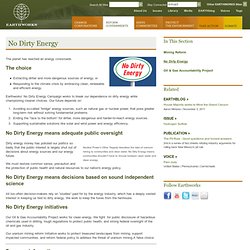
The choice. Coal pollution. Coal generates 54% of our electricity, and is the single biggest air polluter in the U.S. Coal power: air pollution. Burning coal is a leading cause of smog, acid rain, global warming, and air toxics. In an average year, a typical coal plant generates: 3,700,000 tons of carbon dioxide (CO2), the primary human cause of global warming--as much carbon dioxide as cutting down 161 million trees. EPA tells coal-fired plants to reduce pollution. Some may just shut down. [Editor's note: The headlines and story have been updated to clarify that while EPA's actions may cause some power plants to be closed, the agency is not mandating their closure.]
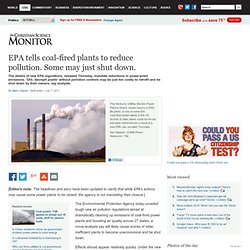
Skip to next paragraph Subscribe Today to the Monitor Click Here for your FREE 30 DAYS ofThe Christian Science MonitorWeekly Digital Edition The Environmental Protection Agency today unveiled tough new air pollution regulations aimed at dramatically cleaning up emissions of coal-fired power plants and boosting air quality across 27 states, a move analysts say will likely cause scores of older, inefficient plants to become uneconomical and be shut down.
Effects should appear relatively quickly. "This is a real milestone," exulted Frank O'Donnell, president of Clean Air Watch, a Washington-based environmental group in a statement. But beyond environmentalists’ cheers, industry groups were predictably upset. The industry doesn’t have long. Delay in Coal Pollution Rules Took Toll in Lives. A tough new pollution standard for power plants proposed this week by the Environmental Protection Agency will cost utilities at least $10 billion, and several companies have already signaled that they will close aging coal plants rather than upgrade to meet the new standards.
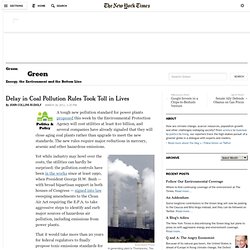
The new rules require major reductions in mercury, arsenic and other hazardous emissions. Associated PressA generating plant in Thompsons, Tex. Yet while industry may howl over the costs, the utilities can hardly be surprised: the pollution controls have been in the works since at least 1990, when President George H.W. Bush — with broad bipartisan support in both houses of Congress — signed into law sweeping amendments to the Clean Air Act requiring the E.P.A. to take aggressive steps to identify and curb major sources of hazardous air pollution, including emissions from power plants. During the Clinton administration, Mr. ”We expect the E.P.A. to decide that they are going to regulate mercury from us,” he said.
STUDY SAYS COAL PLANT POLLUTION KILLS 30,000 A YEAR. The Clean Air Task Force, on behalf of the Clear the Air campaign, commissioned Abt Associates to quantify the health impacts of fine particle air pollution, commonly known as soot, from power plants, as well as the expected benefits (avoidable deaths, hospitalizations, etc.) of policies that would reduce fine particle pollution from power plants.
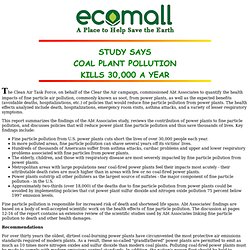
The health effects analyzed include death, hospitalizations, emergency room visits, asthma attacks, and a variety of lesser respiratory symptoms. This report summarizes the findings of the Abt Associates study, reviews the contribution of power plants to fine particle pollution, and discusses policies that will reduce power plant fine particle pollution and thus save thousands of lives. Key findings include: Fine particle pollution is responsible for increased risk of death and shortened life spans. Abt Associates' findings are based on a body of well-accepted scientific work on the health effects of fine particle pollution.
Recommendations. Western Coal Pollution: EPA Deal Would Speed Haze Reduction. BILLINGS, Mont. -- Aging coal-fired power plants across the West could be forced to install costly pollution control equipment under an agreement between federal regulators and environmentalists aimed at jump-starting a delayed clean air initiative.
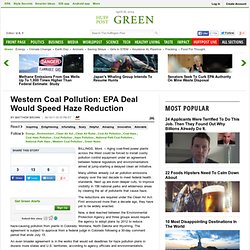
Many utilities already cut air pollution emissions sharply over the last decade to meet federal health standards. Next up are even deeper cuts, to improve visibility in 156 national parks and wilderness areas by clearing the air of pollutants that cause haze. The reductions are required under the Clean Air Act. First announced more than a decade ago, they have yet to be widely enacted. Now, a deal reached between the Environmental Protection Agency and three groups would require the agency to adopt plans by 2012 to reduce haze-causing pollution from plants in Colorado, Montana, North Dakota and Wyoming. Putting the plans into action nationwide could cost up to $1.5 billion a year, according to the EPA. What's the Coal Pollution Risk in Your Life? Mountaintop Removal Coal Companies Agreed To Curb Pollution, Then Polluted More.
By Travis Waldron on June 28, 2011 at 2:57 pm "Mountaintop Removal Coal Companies Agreed To Curb Pollution, Then Polluted More" Frasure Creek Mining mountaintop removal near Brushy Fork, KY Two coal companies accused of polluting streams in eastern Kentucky continued to pollute streams at higher levels than their permits allowed even after reaching an agreement with the state to stop.

In October, environmental groups filed notice to sue International Coal Group (ICG) and Frasure Creek Mining over the pollution of streams. But according to a new suit filed by the environmental groups, the companies not only failed to stop polluting, they are actually polluting at even higher levels than they were before the agreement. Lisenby’s and Chance’s affidavits allege a review of the companies’ DMRs showed the companies “self-reported” pollution levels as much as eight to 15 times above allowable, permitted levels of several pollutants. Clean Coal’s Dirty Secret - When 'Clean' Isn't Clean — Coal-Fired Power Plants - Water Pollution.